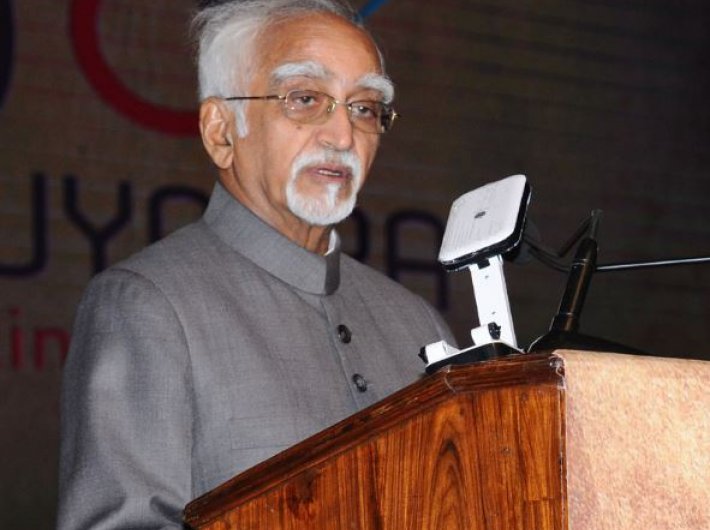Tolerance is a virtue. It is freedom from bigotry. It is a version of the golden rule in that, insofar as we want others to treat us decently, we need to treat them decently as well, Ansari had said
Outgoing vice president Hamid Ansari has batted for tolerance and the spirit of pluralism and called for the need to accommodate cultural diversity in his speeches that he has made over the years.
The election of the vice president will take place on August 5. Ansari’s term ends on August 11.
Here is what Ansari said:
At the inauguration of the Interfaith Conference at Malappuram, Kerala on January 12, 2016
“Tolerance is a virtue. It is freedom from bigotry. It is a version of the golden rule in that, insofar as we want others to treat us decently, we need to treat them decently as well. It is also a pragmatic formula for the functioning of society without conflict between different religions, political ideologies, nationalities, ethnic groups, or other us-versus-them divisions.
“Acceptance goes a step beyond tolerance. It is a person's assent to the reality of a situation, recognizing a process or condition without attempting to change it, protest, or exit. You can tolerate something without accepting it, but you cannot accept something without tolerating it.
“Moving from tolerance to acceptance is a journey that starts within ourselves; within our own understanding and compassion for people who are different to us. We need to challenge ourselves to see beyond the stereotypes and preconceptions that prevent us from accepting others. Dialogue removes misunderstanding and promotes empathy and understanding. Dialogue is essential for developing any understanding. And in this crucial task interfaith dialogue plays an important role,” said Ansari.
At the launch of book, Hope in a challenged democracy, An Indian narrative by Ashwini Kumar on April 10, 2017
“It is a truism that all democracies contain within them tensions between societal constraints and individual liberties, dictates of state security and citizen’s freedom, as well as between the divergent political, social and economic approaches. The challenge at all times is to mould the tensions in such a manner as to retain the focus on the proclaimed objectives of the society concerned.
“In our country and given the inherent contradictions emanating from diversities and inequalities, the operation of a democratic polity was always going to be ‘challenged’. This is what Ambedkar meant when he talked on November 29, 1949 about the ‘life of contradictions’ and of his apprehension about inequality blowing up the structure of political democracy.
In some measure, and despite the comprehensiveness of Parts III, IV and IVA of the Constitution and the immensity of changes since 1950, his apprehensions retain an element of validity. Social justice, equality and dignity of the individual have yet to be attained in sufficient measure and this is reflected graphically in the placement we receive in UNDP’s Human Development Index for 2015 – 130 out of 188 countries surveyed.
At 22nd Justice Sunanda Bhandare Memorial Lecture ‘Dismantling Patriarchy Challenges Ahead’ on November 30, 2016.
“The inference from available evidence, therefore, is that patriarchy does not stand dismantled and that the current efforts by government and society are at best aimed to produce equity of varying intensity rather than substantive equality. The challenge of moving from the former to the latter is thus imperative. Without it, questions would remain on the sustainability of gender equality.”
Delivering a lecture, Indian Democracy: Achievements and Challenges, to students at Corvinus University in Hungary on October 18, 2016
“The superstructure of a democratic polity and a secular state structure, put in place in modern India, is anchored in the existential reality of a plural society.”
“Indian culture is syncretic in character… It is a veritable human laboratory where the cross breeding of ideas, beliefs and cultural traditions has been in progress for a few thousand years. The national movement recognised this cultural plurality and sought to base a national identity on it,” he said.
Delivering Indira Gandhi Memorial Lecture of The Asiatic Society on October 3, 2016
“Today, we are confronted by a paradox. While the registered voter participation in elections has steadily increased, the actual functioning of the legislatures has steadily decreased. The Lok Sabha, in the period 1952-1974 uniformly registered more than 100 sittings each year; the corresponding figure in the 2000-2015 period has never exceeded 85 and has in some years gone as low as 46. (The Rajya Sabha sittings in earlier years were at times fewer but now the two Houses adjourn on the same dates). As a consequence, scrutiny of proposed legislation is in many cases perfunctory; also, less time is available for seeking the accountability of the executive through procedural devices like questions, debates and discussion.
“The picture in state legislatures is worse with some state assemblies being convened, in a pro forma exercise, for less than 10 days every year.
“Thus while the public participation in the electoral exercise has noticeably improved, public satisfaction from the functioning of elected bodies is breeding cynicism with the democratic process itself. The imperative for a corrective is evident to reinforce public confidence in the ability of the system to deliver, as intended.”
